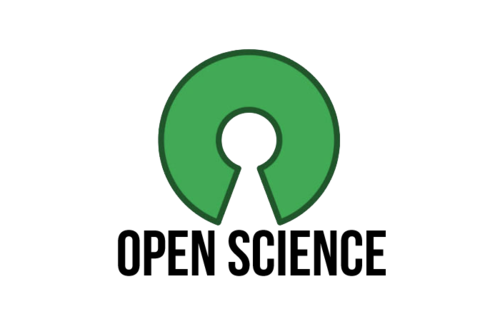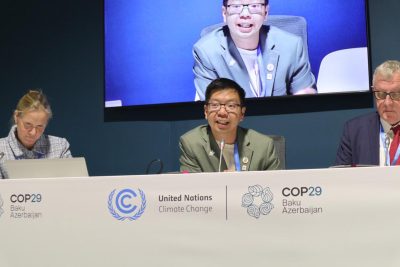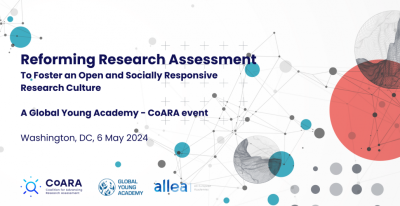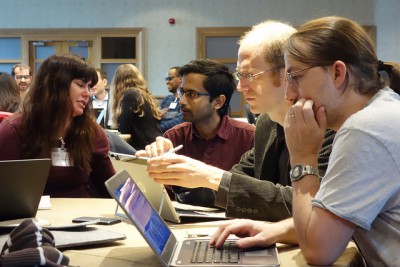
Open Science fosters research communication that is inclusive, effective, and conducive to collaboration and discovery across fields and locations. The Working Group on Open Science aims to inform current transformations in publication systems, institutions and technologies by (1) garnering and voicing young researchers’ views on which scientific outputs should be disseminated, how, to whom and with which expectations; (2) investigating the challenges and opportunities involved in implementing Open Science mandates across highly diverse research environments; (3) promoting Open Science mandates across the GYA membership and collaborators.

In 2024/25, the group continues to organise Open Science First Fridays – a public talk series on open science aspects, from ChatGPT to open science policy, on every first Friday of a month, with GYA members and alumni, as well as external experts as speakers.
For upcoming lectures, and also to watch videos of past lectures, see here.
********************************************************************************************
The GYA Open Science working group is working together with key stakeholders in the Open Science movement and is actively promoting policy change towards Open Science. We promote an inclusive approach towards Open Science, with a special focus on Open Access, Open Data, Open Software and a new initiative on Open Conferences. While policy change towards Open Science is in full swing, we are also working to increase awareness of Open Science and its uptake by (young) scientists.
We have an ongoing collaboration with CODATA (Committee on Data of the International Council for Science) and the Research Data Alliance towards developing international training and policy guidelines on Open Data.
In 2019, the GYA – led by its Open Science working group – joined forces with COAlition S to develop a Plan S Monitor Task Force.
In 2020, the GYA became part of a consortium, led by F1000 Research, a leading Open Access publisher, and also including Eurodoc and LIBER as partners, that was awarded a contract to build and promote the European Commission’s free Open Access publishing platform for scientific articles – Open Research Europe.
You can discover more about this project on the Open Research Europe resource page.
Our ongoing collaboration with Open Research Europe provides the GYA with an opportunity to promote Open Science more generally, and will help support the Open Science workshop “Scientific publishing: A global perspective from early-career researchers on open access dissemination and data sharing”, which will take place at the GYA’s 2023 Annual General Meeting and International Conference of Young Scientists in Kigali, Rwanda. For more information, see our 2023 AGM and Conference programme here.
In addition to the Open Science workshop at the 2023 GYA Young Scientists Conference in Rwanda, the group is organising the First Friday series on open science issues throughout the year, and will conduct a literature survey examining whether data reuse is more prevalent in certain geographic regions within the life sciences.
Moreover, from February 2023, the group’s co-lead Stephanie Jurburg is representing the GYA on the ALLEA Open Science Task Force. GYA alumnus Koen Vermeir had previously held this position.
In November 2025, the group organised the next lecture in its “Open Science First Fridays” lecture series on Open Science: Veronique Kiermer, Chief Scientific Officer at PLOS, who also recently joined the GYA Advisory Board, spoke on “Can we redefine publishing beyond the article and beyond the APC?”
In April 2025, a working group at the German National Academy of Sciences Leopoldina published a statement on “A New Concept for the Direct Funding and Evaluation of Scientific Journals”. Group co-lead Stephanie Jurburg was part of the team of authors. They propose a new funding principle for scientific journals that would make these publications freely available to everyone. Thus, a key aspect is for the funding of journals to follow the same procedure as publicly funded research. The discussion paper can be found here.
In November 2024, group members, together with members from several other GYA working groups, jointly published a statement on “Young researchers and scholars’ proposals for action for a sustainable present and future”. GYA Alumnus Renard Siew presented the statement during the “Climate Science: key take aways in 2024” event co-organized by the International Science Council (ISC) and the Karlsruhe Institute of Technology (KIT).

In October 2024, the group held their next Open Science First Fridays lecture. Eleonora Colangelo, Open Science Policy Analyst, Frontiers/Research Integrity Trainer/Ambassador for CrossrRef and COS, presented on “From Action to Activism: Open Advocacy in Policy and Practice”, exploring recent developments in Open Science policy and highlighting the role of Open Advocacy in establishing a positive feedback loop for open scientific practices. You can watch the recording from the session on YouTube here.
In September 2024, the group’s monthly Open Science First Fridays lecture discussed “Building an interconnected scholarly ecosystem with Persistent Identifiers (PIDs). You can watch the recording from the session on YouTube here.
In August 2024, the group ran another of their Open Science First Fridays lectures. Kelly Woods (Publisher at F1000 publishing) presented on “Multilingual Open Access Publishing”. You can watch the recording from the session on YouTube here.
In May 2024, group members co-organised a workshop on “Reforming Research Assessment to Foster an Open and Socially Responsive Research Culture” jointly with the Coalition for Advancing Research Assessment (CoARA) as well as with the GYA working groups on Scientific Excellence and on Trust in (Young) Scientists. The joint session was part of the GYA Annual General Meeting in Washington DC, USA. You can watch the workshop recording here.

At the same GYA meeting, the group also organised a “Lunch with the Editor” session. Jianhong Zhou (Senior Editor at PLoS ONE) and Yamini Dalal (ELife’s Deputy Editor) took the opportunity to chat to GYA members in an informal setting about Open Science matters.
In March 2024,the group successfully organised the next lecture in their Open Science First Fridays lecture series. You can watch the recording from the session on “Good science needs good working conditions – Perspectives from Open Science and Good Research Practice” with Rima-Maria Rahal from the May Planck Institute for Research on Collective Goods, Germany, on YouTube here.
In February 2024, the group successfully organised the next lecture in their Open Science First Fridays lecture series. You can watch the recording from the session on “Back to the drawing board: APCs and sustainable scholarly publishing” with Agata Morka from PLOS on YouTube here.
In December 2023, the group facilitated a Memorandum of Understanding between the GYA and PLOS – The Public Library of Science, to advance Open Science principles.
In November 2023, the group successfully ran the next lecture in their Open Science First Fridays lecture series. You can watch the recording from the session on “Same data, different analysts: variation in effect sizes due to analytical decisions in ecology and evolutionary biology” on YouTube.
In October 2023, the group successfully ran the next lecture in their Open Science First Fridays lecture series. You can watch the recording from the session on “What are publishers doing to enable Open Science?” on YouTube.
In September 2023, the group successfully ran the next lecture in their Open Science First Fridays lecture series. You can watch the recording from the session on “Legal issues in Open Science” on YouTube here.
In August 2023, the group successfully ran the next lecture in their Open Science First Fridays lecture series. You can watch the recording from the session on “Implementing Open Science in a research organisation” on YouTube here.
In June 2023, as part of the GYA Annual General Meeting in Kigali, Rwanda, the group organised a conference session on “Scientific Publishing: a global perspective from early-career researchers on open access dissemination of scientific discovery & data sharing”. Read the full report here.
The group also organised a “lunch with the editors” event at the AGM 2023, which included editors from Nature and PLOS ONE.
In May 2023, the group successfully ran the second lecture in its Open Science First Fridays lecture series. You can watch the recording from the session on “Regional Open Science Policy Implementation” on YouTube here.
In April 2023, the group successfully ran its first lecture as part of its Open Science First Fridays public talk series on open science aspects. You can watch the recording from the session on “ChatGPT and Open Science policy” on YouTube here.
In December, working grop co-lead Stephanie Jurburg was appointed as one of the Research Data Alliance’s ambassadors for 2023. Her project will focus on improving the accessibility of microbial sequence data worldwide, from data archiving to data reuse.
In December, the Journal of Science Policy & Governance (JSPG), UNESCO, and the Major Group for Children and Youth (MGCY) released a Special Topic Issue on Open Science Polices as an Accelerator for Achieving the Sustainable Development Goals, for which the GYA working group on Open Science had acted as an outreach partner.
In September 2022, group co-lead Natasha Gownaris and group member Luciana Balboa gave a presentation on barriers to open science implementation towards the SDGs at the GYA online event “Young and Global – A perspective on today’s challenges in science” together. This event was part of the Science Summit of the United Nations General Assembly (UNGA77). Read more about the session and watch the full presentation here.
In August, Jim Curtiss, GYA Communications Officer, explained how Open Research Europe addresses the current ‘peer review crisis’ in a blog post here.
Group members, together with members from the Global working group on Open Science, have led the publication of two articles on Open Science in CODATA, one on “Open Science – For Whom?” and another on “Barriers to Full Participation in the Open Science Life Cycle among Early Career Researchers“.
From 2020-2022, group members also were part of the Global working group on Open Science, was had been coordinated by the GYA and included members from the GYA as well as from 25 National Young Academies from all over the world.
In 2021, the GYA joined several young academies and science organisations from around the world in signed up to a statement on “Article-Processing Charges (APC) Policies on Open Access (OA) Publishing Model: the Impact on Developing Countries and the Need for a Multilateral Solution”. This initiative arose from a group of young scientists who are members of the TWAS Young Affiliates Network (TWAS-TYAN) and the Argentinian Young Academy (AJA).
The 2021 Annual General Meeting (AGM) and International Conference of Young Scientists “Trust in Science” included a panel discussion on the topic during our “Building Trust with Open Science” session.
GYA alumna Sabina Leonelli (UK) represented the GYA within the Open Science Policy Platform of the European Commission from 2016-2020. The Platform’s final report can be accessed here.
Former working group co-lead Koen Vermeir (France) participated in the UNESCO Virtual Ministerial Dialogue on COVID-19 and “Open Science” held on 30 March 2020.
Former working group co-lead Koen Vermeir (France) delivered the opening keynote speech at the meeting on “Changing publication practices – From predatory to Plan S” organized by the Belgian Young Academy (Jonge Academie) and the Belgian Academy of Medicine in Brussels, Belgium, in February 2020.
Former working group co-lead Koen Vermeir (France) attended the ‘Open Science Coordination in Europe’ meeting in Helsinki, Finland, in October, where the new network of national open science coordinators was inaugurated. He also represented the GYA at the meeting of the Open Science Policy Platform (OSPP) of the European Commission in Helsinki.
In October 2019, group members contributed to the “Stakeholder Consultation on the Report by the Expert Group on the Future of Scholarly Publishing and Scholarly Communication (E03463), European Commission, Directorate-General for Research and Innovation 2019”; see here.
In September, former working group co-lead Koen Vermeir (France) spoke about Plan S at the 2019 Open Science Fair.
Group co-lead Abel Polese (Estonia) attended the African Open Science Platform (AOSP) Delivery Phase Planning Workshop in Alexandria, Egypt, in early September 2019. The purpose of this workshop was to deliberate on and design the implementation phase of the AOSP initiative with key regional stakeholders and international representatives. For more details, please see here for Abel’s meeting report.
Working group member Koen Vermeir (France) represented the GYA at the European Commission’s Open Science Policy Platform (OSPP) meeting in Bucharest, Romania, in April 2019, where the future of scholarly communication and new indicators for open science were discussed.
Working group member Koen Vermeir (France) attended the Society for Scholarly Publishing Conference on ‘Bringing Value in Academic Publishing: Practical Solutions for Thriving in a Changing Environment‘ in Berlin, Germany, in January 2019.
GYA alumna Sabina Leonelli was interviewed on the “Early-career researchers’ response to Plan S” for the International Science Council’s “Plan S” blog.
Members of this group coordinated the drafting and publication of the Joint Young Academies Statement on ‘Opportunities and Challenges for Implementing Plan S – The View of Young Academies’ in October 2018, which is the result of discussions among several European young academies and the GYA.
GYA alumna Sabina Leonelli acted as one of the rapporteurs for the Open Science Policy Platform Recommendations published in May 2018. They can be accessed here.
Several members of the Open Science group were involved in the publication of the 2018 report on “Global Access to Research Software: The Forgotten Pillar of Open Science Implementation” by the GYA working group on Global Access to Research Software (March 2018).
